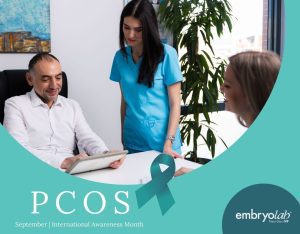
Michael Kiriakidis, MD, Msc , IVF Specialist, Deputy Scientific Director Embryolab IVF Clinic
Polycystic ovarian syndrome (PCOS) is a common gynecological disorder prevalent in approximately 6-20% women of childbearing age. This enigmatic condition is a constellation of endocrine and metabolic disorders that creates challenges in its diagnosis and management, as leading symptoms may vary with age and treatment may be tailored to specific requirements.
Diagnostic criteria of PCOS are still under debate. At the moment, women having any two of the consecutive three features could be diagnosed with PCOS: oligo-ovulation or anovulation (i.e. postponed ovulation or even no ovulation in a cycle), clinical or biochemical evidence of excess androgens and polycystic ovarian morphology (i.e. numerous small follicles in ultrasound images of the ovaries). The symptoms of PCOS involve serious reproductive dysfunctions (including infertility and pregnancy complications), unbalanced metabolic functions (including insulin resistance, type 2 diabetes) as well as psychological disorders (mainly including depression and anxiety) which disturb women from adolescence to menopause.
The etiology and pathogenesis of PCOS is complex and multifactorial and, to a certain extent, not fully known. It may involve hereditary or genetic causes as well as environmental factors. Indeed, it seems that PCOS is more widespread in certain specific families than in the overall population. In addition, there are almost 241 gene variations, identified as responsible for PCOS, which could lead to ovarian dysfunction and abnormal hormone secretion. Other aspects, which might contribute to PCOS, consist of epigenetic changes due to interaction of the environment during fetal and childhood development.
Whatever the cause, PCOS can have serious short and long-term consequences on women. In the long run, affected women are at risk for metabolic complications such as cardiovascular disease, obesity, diabetes and hypertension. However, the leading indication in young women of reproductive age is infertility. Anovulatory cycles and hormonal disorders block natural conception and hinder a young couple’s effort to start a family.
Still, there is a silver lining. Medical and lifestyle interventions will help the majority of women with PCOS. Lifestyle modifications are regarded as the cornerstone of all interventions against PCOS, especially for patients disturbed by overweight or obesity. The most effective interventions include applicable diet modifications, increased physical activity and exercise modifications, ensuring adequate and high-quality sleep and most important strategies to maintain devotion to this new way of life.
If medical assistance is needed, then IVF is the safest and most successful way to treat infertility in PCOS patients. Our growing knowledge of this enigmatic problem has transformed Assisted Reproductive Techniques into a secure journey towards a family.
In EMBRYOLAB, 20 years of experience has highlighted the need of a holistic and tailored approach in treating PCOS patients. Our understanding of all the different aspects of PCOS has driven us to implement medical modifications as well as lifestyle interventions in order to help our patients.





